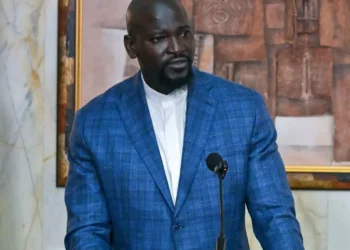President Nana Addo Dankwa Akufo-Addo has called upon women judges to utilize their collective legal expertise to dismantle barriers to justice and combat negative cultural practices that adversely affect women and children.
Speaking at the International Association of Women Judges (IAWJ) Conference in Accra on Monday, President Akufo-Addo emphasized the importance of judges in redefining norms and setting precedents that protect the vulnerable and marginalized. He highlighted that the fight against these practices extends beyond courtrooms, emphasizing the need for education, awareness, and collaborative governance.
The President stressed the importance of engaging traditional leaders, educators, and communities to reshape mindsets and attitudes, particularly in schools, homes, and community gatherings where the foundational beliefs of the next generation are formed.
“Their experiences, often mirroring the societal challenges we seek to overcome, equip them uniquely to advocate for justice and fairness. In dealing with issues like gender-based violence, child marriage, widowhood rites, and female genital mutilation – practices steeped in deep-rooted cultural norms – your voices and rulings can resonate deeply, driving societal transformation.”
President Nana Addo Dankwa Akufo-Addo
President Akufo-Addo also acknowledged the pivotal role of the International Association of Women Judges in promoting the participation of women in the judiciary. Since its inception 30 years ago, the association has been instrumental in enhancing the quality of justice, supporting the professional growth of women in the judiciary, and advocating for fairness and gender equality.
The President again noted that the presence of women at all levels of the judicial system not only enriches the judiciary’s perspective but also strengthens public confidence in the justice delivery system. He highlighted his appointments of numerous women to various levels of the judicial ladder, including two Chief Justices, underscoring the spirit of justice and equality within Ghana’s judiciary.
Ghana has implemented and enforced laws aimed at protecting women and girls from harmful practices, including the Domestic Violence Act of 2007 and the Human Trafficking Act of 2005. The government has also outlawed female genital mutilation and collaborates with NGOs to conduct awareness campaigns against negative cultural practices.
President Nana Addo Dankwa Akufo-Addo stated, “These campaigns are aimed at changing societal attitudes and norms that perpetuate these practices. Their expertise and empathetic adjudication have consistently reinforced the protective framework for women and children”
The President further assured that the Government of Ghana is committed to supporting the judiciary to ensure justice for all, including improving judicial infrastructure and ensuring the safety and security of judges.
Founded in 1991, the International Association of Women Judges is a non-profit, non-governmental organization that brings together judges from all levels of the judiciary worldwide. Through judicial and community-level responses, the association addresses issues of gender-based violence, human trafficking, early and forced marriages, corruption, and discrimination in employment, inheritance, education, and health services.
In recent years, Ghana’s judiciary has experienced notable changes, especially in the increased representation of women in key positions. This shift is part of a broader trend across Africa towards gender equality within the legal system. Women are now serving as chief justices, presidents of Constitutional Courts, justices, and magistrates.
This surge in female participation reflects a push for gender equality in decision-making roles, with the belief that women judges will advocate for women’s rights. However, research on the impact of women judges, especially regarding gender-based issues, remains limited.
One area where the influence of women judges is evident is in shaping the law on spousal property rights in Ghana. Historically, property acquired during marriage was considered solely owned by the husband, excluding the wife.
Over time, court decisions evolved to recognize women’s contributions to joint property, with women judges playing a significant role in this process. Despite constitutional provisions, comprehensive legislation on spousal property rights is lacking, leaving courts to continue defining these rights based on evolving societal norms.
Ghana’s judiciary has seen a notable increase in female representation, contributing to advancements in the law, particularly in areas concerning gender equality and spousal property rights.



















